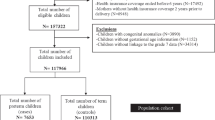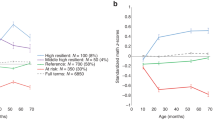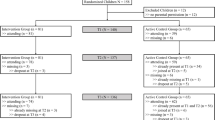Abstract
Background
Adaptive computerized interventions may help improve preterm children’s academic success, but randomized trials are rare. We tested whether a math training (XtraMath®) versus an active control condition (Cogmed®; working memory) improved school performance. Training feasibility was also evaluated.
Methods
Preterm born first graders, N = 65 (28–35 + 6 weeks gestation) were recruited into a prospective randomized controlled multicenter trial and received one of two computerized trainings at home for 5 weeks. Teachers rated academic performance in math, reading/writing, and attention compared to classmates before (baseline), directly after (post), and 12 months after the intervention (follow-up). Total academic performance growth was calculated as change from baseline (hierarchically ordered—post test first, follow-up second).
Results
Bootstrapped linear regressions showed that academic growth to post test was significantly higher in the math intervention group (B = 0.25 [95% confidence interval: 0.04–0.50], p = 0.039), but this difference was not sustained at the 12-month follow-up (B = 0.00 [−0.31 to 0.34], p = 0.996). Parents in the XtraMath group reported higher acceptance compared with the Cogmed group (mean difference: −0.49, [−0.90 to −0.08], p = 0.037).
Conclusions
Our findings do not show a sustained difference in efficacy between both trainings. Studies of math intervention effectiveness for preterm school-aged children are warranted.
Impact
-
Adaptive computerized math training may help improve preterm children’s short-term school performance.
-
Computerized math training provides a novel avenue towards intervention after preterm birth.
-
Well-powered randomized controlled studies of math intervention effectiveness for preterm school-aged children are warranted.
Similar content being viewed by others
Log in or create a free account to read this content
Gain free access to this article, as well as selected content from this journal and more on nature.com
or
References
March of Dimes, PMNCH, Save the Children, WHO. in Born Too Soon: The Global Action Report on Preterm Birth (eds Howson, C., Kinney, M. & Lawn, J.) (World Health Organization, Geneva, 2012).
Davis, E. P. et al. Children’s brain development benefits from longer gestation. Front. Psychol. 2 (2011). https://doi.org/10.3389/fpsyg.2011.00001.
Jaekel, J., Baumann, N. & Wolke, D. Effects of gestational age at birth on cognitive performance: a function of cognitive workload demands. PLoS ONE 8, e65219 (2013).
MacKay, D. F., Smith, G. C. S., Dobbie, R. & Pell, J. P. Gestational age at delivery and special educational need: retrospective cohort study of 407,503 schoolchildren. PLoS Med. 7, e1000289 (2010).
McCormick, M. C. et al. Early intervention in low birth weight premature infants: results at 18 years of age for the Infant Health and Development Program. Pediatrics 117, 771–780 (2006).
Jaekel, J., Bartmann, P., Schneider, W. & Wolke, D. Neurodevelopmental pathways to preterm children’s specific and general mathematic abilities. Early Hum. Dev. 90, 639–644 (2014).
Wolke, D. et al. Universal gestational age effects on cognitive and basic mathematic processing: 2 cohorts in 2 countries. J. Pediatr. 166, 1410-6.e1–2 (2015). https://doi.org/10.1016/j.jpeds.2015.02.065.
van Veen, S. et al. Very preterm born children at early school age: healthcare therapies and educational provisions. Early Hum. Dev. 117, 39–43 (2018).
Grunewaldt, K. H., Skranes, J., Brubakk, A. M. & Lähaugen, G. C. Computerized working memory training has positive long-term effect in very low birthweight preschool children. Dev. Med. Child Neurol. 58, 195–201 (2016).
Lohaugen, G. C. C. et al. Computerized working memory training improves function in adolescents born at extremely low birth weight. J. Pediatr. 158, 555–556 (2011).
Anderson, P. J. et al. Long-term academic functioning following cogmed working memory training for children born extremely preterm: a randomized controlled trial. J. Pediatr. 202, 92–7.e4 (2018).
Roberts, G. et al. Academic outcomes 2 years after working memory training for children with low working memory: a randomized clinical trial. JAMA Pediatr. 170, e154568 (2016).
Stern, E. in Human Development from Early Childhood to Early Adulthood: Evidence from the Munich Longitudinal Study on the Genesis of Individual Competencies (LOGIC) (eds Schneider, W. & Bullock, M.) 221–237 (Erlbaum, Mahwah, 2009).
Gilmore, C. K. & Papadatou-Pastou, M. Patterns of individual differences in conceptual understanding and arithmetical skill: a meta-analysis. Math. Think. Learn. 11, 25–40 (2009).
Fuchs, L. S. et al. Problem solving and computational skill: Are they shared or distinct aspects of mathematical cognition? J. Educ. Psychol. 100, 30–47 (2008).
Blair, C. & Raver, C. C. School readiness and self-regulation: a developmental psychobiological approach. Annu. Rev. Psychol. 66, 711–731 (2015).
Vasilyeva, M., Laski, E. V. & Shen, C. Computational fluency and strategy choice predict individual and cross-national differences in complex arithmetic. Dev. Psychol. 51, 1489–1500 (2015).
Carr, M. & Alexeev, N. Fluency, accuracy, and gender predict developmental trajectories of arithmetic strategies. J. Educ. Psychol. 103, 617–631 (2011).
Cirino, P. T., Fuchs, L. S., Elias, J. T., Powell, S. R. & Schumacher, R. F. Cognitive and mathematical profiles for different forms of learning difficulties. J. Learn. Disabil. 48, 156–175 (2015).
Mulder, H., Pitchford, N. J. & Marlow, N. Inattentive behaviour is associated with poor working memory and slow processing speed in very pre-term children in middle childhood. Br. J. Educ. Psychol. 81, 147–160 (2011).
Jolles, D. & Crone, E. A. Training the developing brain: a neurocognitive perspective. Front. Hum. Neurosci. 6, 76 (2012). https://doi.org/10.3389/fnhum.2012.00076.
Roberts, G. et al. Can improving working memory prevent academic difficulties? A school based randomised controlled trial. BMC Pediatr. 11, 57 (2011).
Pascoe, L. et al. Preventing academic difficulties in preterm children: a randomised controlled trial of an adaptive working memory training intervention—IMPRINT study. BMC Pediatr. 13, 144 (2013).
Aarnoudse-Moens, C. S. H. et al. Executive function computerized training in very preterm-born children: a pilot study. Games Health J. 7, 175–181 (2018).
XtraMath. https://xtramath.org/#/home/faq (2016).
Johnson, S., Marlow, N. & Wolke, D. Assessing educational outcomes in middle childhood: validation of the Teacher Academic Attainment Scale. Dev. Med. Child Neurol. 54, 544–551 (2012).
Krajewski, K., Küspert, P. & Schneider, W. Deutscher Mathematiktest für erste Klassen (DEMAT 1+) (Hogrefe, Göttingen, 2002).
Krajewski, K., Liehm, S. & Schneider, W. Deutscher Mathematiktest für zweite Klassen (DEMAT 2+) (Hogrefe, Göttingen, 2004).
McAuley, E., Duncan, T. & Tammen, V. V. Psychometric properties of the Intrinsic Motivation Inventory in a competitive sport setting: a confirmatory factor analysis. Res. Q. Exerc. Sport 60, 48–58 (1989).
Ryan, R. M. & Deci, E. L. Intrinsic and extrinsic motivations: classic definitions and new directions. Contemp. Educ. Psychol. 25, 54–67 (2000).
Simms, V. et al. Nature and origins of mathematics difficulties in very preterm children: a different etiology than developmental dyscalculia. Pediatr. Res. 77, 389–395 (2015).
Rivera, S. M., Reiss, A. L., Eckert, M. A. & Menon, V. Developmental changes in mental arithmetic: evidence for increased functional specialization in the left inferior parietal cortex. Cereb. Cortex 15, 1779–1790 (2005).
Singal, A. G., Higgins, P. D. R. & Waljee, A. K. A primer on effectiveness and efficacy trials. Clin. Transl. Gastroenterol. 5, e45 (2014).
Johnson, S., Gilmore, C., Gallimore, I., Jaekel, J. & Wolke, D. The long-term consequences of preterm birth: what do teachers know? Dev. Med. Child Neurol. 57, 571–577 (2015).
Johnson, S. et al. Improving developmental and educational support for children born preterm: evaluation of an e-learning resource for education professionals. BMJ Open 9, e029720 (2019).
Cavanagh, S. Districts Put Open Ed. Resources to Work. Education Week. Spotlight On Digital Math Instruction: 2 (2016).
Herold B. Doing Ed-Tech Right in the Early Years. Education week. Spotlight On Digital Math Instruction: 12-3 (2016).
Melby-Lervåg, M. & Hulme, C. Is working memory training effective? A meta-analytic review. Dev. Psychol. 49, 270–291 (2013).
Grunewaldt, K. H., Løhaugen, G. C., Austeng, D., Brubakk, A. M. & Skranes, J. Working memory training improves cognitive function in VLBW preschoolers. Pediatrics 131, e747–e754 (2013).
Acknowledgements
This study was funded by Stiftung Mercator (grant number PR-2014-0039). We thank all cooperating hospitals, Katholisches Klinikum Bochum, Klinikum Duisburg, Elisabeth Hospital Essen, Vest Children’s Hospital Datteln, University Hospital Duesseldorf, University Hospital Essen, and Helios Klinikum Niederberg in Velbert, for supporting this project. Special thanks to Frauke Dransfeld, Eva Weishaupt, and Gisela Axmacher-Bopp for assistance with recruitment, intervention implementation, data collection and management, and to the study participants, their families, and teachers.
Author information
Authors and Affiliations
Contributions
Substantial contributions to conception and design, acquisition of data, or analysis and interpretation of data: all authors. Drafting the article or revising it critically for important intellectual content: J.J., K.M.H., B.H., A.Z., P.B., and D.W. Final approval of the version to be published: all authors.
Corresponding author
Ethics declarations
Competing interests
The authors declare no competing interests.
Statement of consent
Participants provided written informed consent and assent.
Additional information
Publisher’s note Springer Nature remains neutral with regard to jurisdictional claims in published maps and institutional affiliations.
Supplementary information
Rights and permissions
About this article
Cite this article
Jaekel, J., Heuser, K.M., Zapf, A. et al. Preterm children’s long-term academic performance after adaptive computerized training: an efficacy and process analysis of a randomized controlled trial. Pediatr Res 89, 1492–1499 (2021). https://doi.org/10.1038/s41390-020-01114-w
Received:
Revised:
Accepted:
Published:
Version of record:
Issue date:
DOI: https://doi.org/10.1038/s41390-020-01114-w



